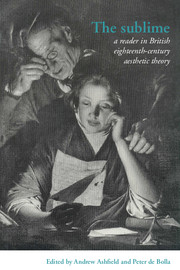Book contents
- Frontmatter
- Contents
- List of Abbreviations
- Introduction
- Part I The Longinian tradition
- Part II Rhapsody to rhetoric
- 11 The spectator, (1712-1714)
- 12 A discourse on ancient and modern learning (1734)
- 13 Characteristicks (1714)
- 14 The works (1724)
- 15 To David Fordyce, 18th June 1742
- 16 The pleasures of imagination (1744)
- 17 An essay on the sublime (1747)
- 18 Observations on man (1749)
- 19 Lectures on the sacred poetry of the Hebrews (1753/1787)
- 20 A dictionary of the English language (1755)
- 21 Conjectures on original composition (1759)
- 22 The art of speaking (1761)
- 23 A course of lectures on oratory and criticism (1777)
- 24 An enquiry concerning the principles of taste (1785)
- Part III Irish Perspectives
- Part IV The Aberdonian Enlightenment
- Part V Edinburgh and Glasgow
- Part VI From the Picturesque to the Political
- Sources and further reading
18 - Observations on man (1749)
Published online by Cambridge University Press: 05 June 2012
- Frontmatter
- Contents
- List of Abbreviations
- Introduction
- Part I The Longinian tradition
- Part II Rhapsody to rhetoric
- 11 The spectator, (1712-1714)
- 12 A discourse on ancient and modern learning (1734)
- 13 Characteristicks (1714)
- 14 The works (1724)
- 15 To David Fordyce, 18th June 1742
- 16 The pleasures of imagination (1744)
- 17 An essay on the sublime (1747)
- 18 Observations on man (1749)
- 19 Lectures on the sacred poetry of the Hebrews (1753/1787)
- 20 A dictionary of the English language (1755)
- 21 Conjectures on original composition (1759)
- 22 The art of speaking (1761)
- 23 A course of lectures on oratory and criticism (1777)
- 24 An enquiry concerning the principles of taste (1785)
- Part III Irish Perspectives
- Part IV The Aberdonian Enlightenment
- Part V Edinburgh and Glasgow
- Part VI From the Picturesque to the Political
- Sources and further reading
Summary
Part First. Chapter IV. Of the six classes of intellectual pleasures and pains. Section I
Of the Pleasures and Pains of Imagination
I begin with the pleasures and pains of imagination; and shall endeavour to derive each species of them by association, either from those of sensation, ambition, self-interest, sympathy, theopathy, and the moral sense, or from foreign ones of imagination. They may be distinguished into the seven kinds that follow.
First, the pleasures arising from the beauty of the natural world.
Secondly, those from the works of art.
Thirdly, from the liberal arts of music, painting, and poetry.
Fourthly, from the sciences.
Fifthly, from the beauty of the person.
Sixthly, from wit and humour.
Seventhly, the pains which arise from gross absurdity, inconsistency, or deformity.
Prop. 94.
To examine how the just-mentioned pleasures and pains of imagination are agreeable to the doctrine of association
Of the pleasures arising from the beauty of the natural world
The pleasures arising from the contemplation of the beauties of the natural world seem to admit of the following analysis.
The pleasant tastes, and smells, and the fine colours of fruits and flowers, the melody of birds, and the grateful warmth or coolness of the air, in the proper seasons, transfer miniatures of these pleasures upon rural scenes, which start up instantaneously so mixed with each other, and with such as will be immediately enumerated, as to be separately indiscernible.
- Type
- Chapter
- Information
- The SublimeA Reader in British Eighteenth-Century Aesthetic Theory, pp. 101 - 105Publisher: Cambridge University PressPrint publication year: 1996
- 1
- Cited by



